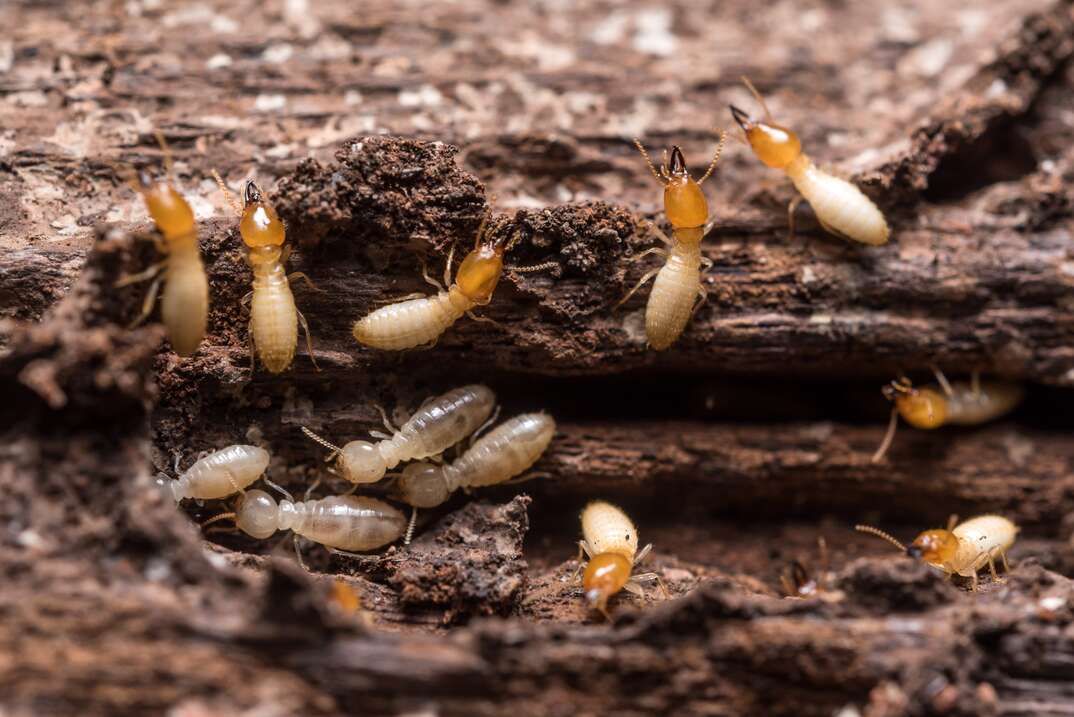- AppliancesElectriciansHVACLandscapingLocksmithPest ControlPlumbingRenovationRoofingT V RepairAll Home Improvement
- Car AccidentClass ActionCorporate LawCriminal DefenseDivorce LawEmployment LawFamily LawFinancial LawLegal AidMedical Injury LawyersMedical MalpracticeReal Estate LawWater Fire RestorationAll Legal
- InvestmentRetirementAll Finance
- Animal InsuranceAutoGeneral InsuranceHealth PolicyHome RentersAll Insurance
- DentalHealth SpecialistsAll Medical
- Animal CareVeterinaryAll Pets
- Auto GlassTowingAll Automotive
Does Homeowners Insurance Cover Termite Damage?

A termite infestation causes an average of $3,000 in damage, but it could cost you a lot more, depending on the severity.
What happens if you find termite damage? Does your homeowners insurance policy cover termites? Find out what kind of response you can expect from your insurance company if you discover termites.
The answer is usually no. Your insurance won't cover termite treatment or repairs for damage caused by termites. It also usually won't pay for other types of pest infestations that cause damage.
That's because pest control is considered a routine maintenance task that's part of your responsibility as the homeowner. If you maintain your home well, you reduce the risk of termites. Having routine termite inspections and preventative treatments is also part of your responsibility. Most damage caused by termites is a result of you not handling the expected maintenance.
However, there could be some exceptions in extreme situations. If termites cause a covered risk or peril, your insurance company might pay for the repairs. For example, if the termites damage your home's electrical wiring, which causes a fire, your homeowners insurance will likely pay for the fire damage since fire is covered. A similar situation is when a covered peril causes termites. For example, if a pipe bursts, causing water damage and moisture that attracts termites, your policy might cover both the water damage and termite damage. Insurance could also cover a sudden home collapse caused by termite damage, but only if you didn't know about the termite issue.
Homeowners Insurance Is Designed to Cover These Incidents
As you've learned, homeowners insurance doesn't usually cover termite damage. So what does it cover? The point of homeowners insurance is to cover accidental and sudden issues. Not only is termite damage preventable, but it also isn't a sudden issue. The infestation and damage take place over a long period of time, with the damage getting progressively worse the longer it goes without being addressed.
Other unexpected and accidental issues are often covered by your homeowner's insurance, including:
- Fire or smoke damage
- Windstorms
- Hail
- Lightning
- Weight of ice and snow
- Theft
- Vandalism
- Damage from aircraft or vehicles
- Falling objects
- Water damage from a sudden and accidental source, such as a burst pipe or your HVAC system
Flooding and earthquake damage aren't usually covered by standard homeowners insurance policies. You can get supplemental insurance policies to cover those situations. Review your policy to explore other exclusions or limitations, so you know what to expect if you have an incident.
Homeowners insurance typically covers structural damage, personal belongings, liability if someone gets hurt on your property and additional living expenses (ALE). The ALE coverage pays for things such as hotels and meals at restaurants if you're displaced while your home is repaired after a covered event.
Since homeowners insurance doesn't typically cover termite damage, you'll need to handle the repairs yourself. Call a pest control company as soon as you notice the termite infestation to get rid of them before they cause more damage. Termite extermination is best left to professionals. Then, you can hire contractors to repair the damages to the structure. Once you repair the issue, be vigilant about inspecting for termites and consider preventative treatments from a pest control service.
How Can You Prevent Termite Damage?
You can avoid termite damage by taking preventative steps to keep termites away. Doing regular home maintenance to keep the structure strong and in good condition is important. Moisture attracts termites, so avoid anything that could cause an increase in moisture, such as poor ventilation and leaks or plumbing issues that you don't repair immediately.
Another way to discourage termites is by keeping your yard clean, especially near your home. Don't place stacks of firewood near your home or other structures, as the wood could attract termites, and those termites will continue into your home. Dead trees and branches near your home can have the same effect. Don't put mulch or plants within 2 feet of your home for additional termite protection.
Elocal Editorial Content is for educational and entertainment purposes only. Editorial Content should not be used as a substitute for advice from a licensed professional in your state reviewing your issue. The opinions, beliefs and viewpoints expressed by the eLocal Editorial Team and other third-party content providers do not necessarily reflect the opinions, beliefs and viewpoints of eLocal or its affiliate companies. Use of eLocal Editorial Content is subject to the
Website Terms and Conditions.The eLocal Editorial Team operates independently of eLocal USA's marketing and sales decisions.



